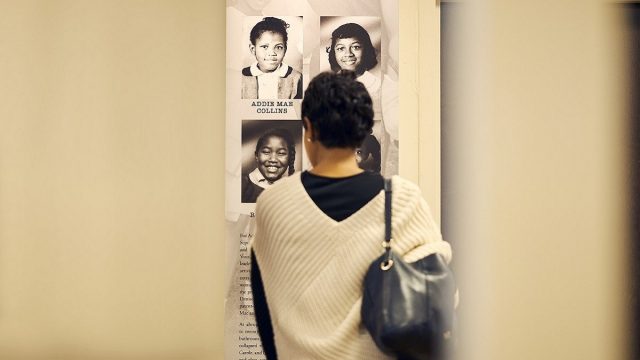
By Alabama Power Foundation
The story of the 16th Street Baptist Church bombing on Sept. 15, 1963, and the tragedy, reconciliation and forgiveness that resulted, must be told with reverence and dignity.
Now, the story of that day is being movingly and professionally presented on the Birmingham church’s lower level, just below the sanctuary. It’s a poignant story – the loss of four innocent girls, the hurting and the healing, and an ongoing message from the church to the world.
As Theodore “Ted” Debro Jr. gazes around the spacious room, its walls displaying panels with words, photos, artifacts, Scripture passages and quotes, he reflects on the new telling of the events that touches the hearts of all who enter the church.
“People need to know what happened here, especially the young people who have no vision of segregation or what people sacrificed,” said Debro, chairman of the church’s board of trustees and the man who spearheaded the changes. “Remembering the Sunday school lesson from that very Sunday on ‘A Love that Forgives,’ we hear that Christian message of caring for one another and making it a better world.”
Debro flips back through iPhone photos to find ones that show this space before the Alabama Power Foundation and other caring community organizations made possible the new interpretation. “The building foundation had been shored up, but see the openness around the bricks? You could see through the walls to the outside. After the bombing there was some repair work done for obvious reasons and other work happened over the years, but this has been the project that enables us to properly use this space.”
For the visitor, time shifts into reverse. Each newly created panel draws on photos gathered from church member families and put in context by a historian who pulled the story together in a comprehensive telling. The sequenced exhibits focus on the building of the city, the building of the community, the church itself and the battle for civil rights.
Debro plants himself before the next exhibit, devoted to the four girls: Addie Mae Collins, Carole Robertson, Cynthia Wesley and Denise McNair. “We’ve placed their memorial in this area, near the bathroom where they were when the explosion went off,” he said. A Vacation Bible School snapshot shows smiling images of three of the girls in happy times; their church membership cards hang next to their black-and-white photos.
Other new exhibits provide more detail about the bombing and the aftermath years of battling for place in society, living the Scripture “A Love that Forgives,” and the congregation’s dedication to its community.
Stepping into the Experience Room, a small space with red-cushioned pews, visitors are plunged into darkness as a stirring video unfolds with interviews, historic photos, moving music and the reality of the day. It’s told with sight, sound and ever-present disbelief. The sudden vibration of the bomb moment stuns the senses just as it changed history. A clock sitting to the side as lights return is frozen at 10:22, the exact time that ordinary Sunday became synonymous with loss.
Little of this interpretation was here before the foundation’s lead gift. Some 100,000 visitors come here annually as walk-ins or in group tours. Debro guides some himself, when not contemplating possible next steps such as a visitor’s center, spaces – perhaps with food – where people could react and discuss their reactions, and a museum honoring both the original church architect Wallace Rayfield and John Petts, creator of the Wales Window in the sanctuary.
“Most of our guides are retired people who were either part of the movement or experienced events in some way,” said Debro. “They all have different experiences, whether they were here that Sunday or have a relative who recounted the story.” Debro’s tours include his own experience of sitting on the front row of the balcony at Ebenezer Baptist Church in Atlanta when he learned the tragic news.
Certain words and moments still trigger emotion despite the elapsed time. As he reads aloud a portion of Scripture inscribed above the altar that stood in the church that day, Debro’s voice cracks and he whispers the final words, “Bless them that curse you, do good to them that hate you.”
Such reactions are not unusual. “People do get emotional just walking into this church. Sometimes they sit and meditate and, now, with these exhibits and the Experience Room, the story is highlighted even more. I easily get choked up.”
Visitors, Debro said, will continue to visit the church and be moved by the messages. “Civil rights is actually the No. 1 draw for visitors to Alabama right now and our tourism ministry, as we refer to it, helps us share our role and our history.
“This is good because when someone leaves 16th Street Baptist Church, we want them to have a commitment to go change whatever they can to make the world better,” he said.
“This church is a jewel in Birmingham and rather than try to repress what really happened, we need to share it, open it up, start conversations, start relationships and open peoples’ eyes to the struggles.”




